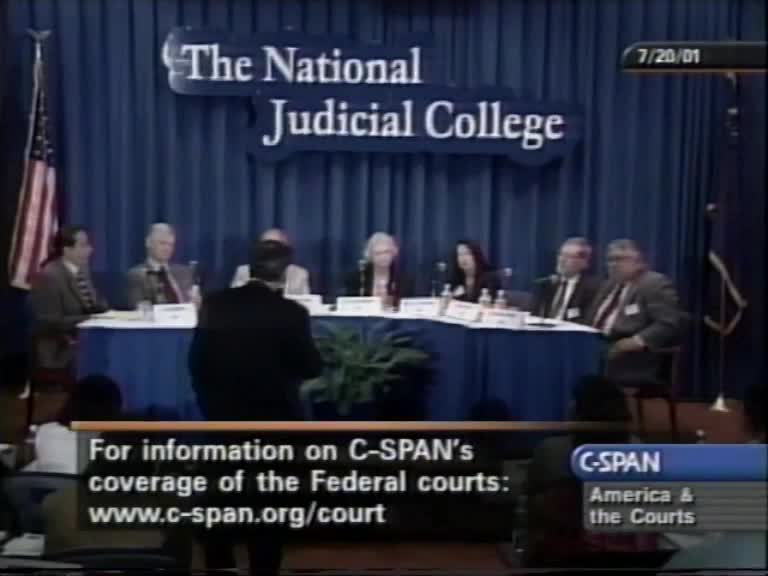Host
What you've seen in the last three days? What are your impressions?
Sandra Day O'Connor
I guess we'd both like to share some thoughts on what the impressions are. And it was a short trip. So I'm sure that what we saw is only a fraction of what's available to see. And I would not think that we gained an insurer knowledge about anything, but we did have some impressions. And the first thing my I noted is that nothing in Indian country is said briefly.
And the second thing is that if you're going to visit Indian country, you have to be prepared to eat heartily. And I noticed I have to confess a general unhappiness with some recent Supreme Court jurisprudence in the area of Indian law. I think that was clear. We also saw a tribal court system in a small tribe setting in the Spokane tribe, and a tribal court system in a very large setting in the Navajo Nation. And the tribal courts that we saw small and large, were functioning and functioning very well. The Navajo court is suffering from a horrendous caseload. Well over 70,000 cases annually And 14 trial court judges now how can you have the left and the facilities in Window Rock, which is probably the best facility? We're limited. So here are judges in need of some additional judges and some enhanced facilities. I think, nevertheless, we met some wonderful judges in, in both tribal court systems that we saw, and people who cared and are determined to function well, and it was very impressive to see that. And we saw some real problems that the tribal court space among them are jurisdictional issues, and those that's in an area where the courts, the federal court, have been involved. And we sense a real need to address those problems, I think and my sense is that it could possibly be necessary to look to legislation for some help there. And we want to talk about that in a minute. And we saw the juvenile drug court that the Spokane tribe operates.
And we saw a peacemaking proceeding in the Navajo court system. And both were functioning so well. The juvenile drug court involved about seven different people, from their probation officer to the counselor and on down all focusing on the young person in trouble and really trying to give a good resolution to the problem and to help that young person, correct whatever the problem was, it seems to be working quite well, their results so far good. And we were very impressed with it. And I've always favored alternative dispute resolution or mediation. And we were told by the Chief Justice of the Navajo Supreme Court that they don't regard peacemaking as alternative dispute resolution, but it looked a lot like mediation to me nonetheless. And it seems to be working extremely well. And I like seeing that. So I thought that courts around the nation might enjoy seeing what we saw in those two courts and and learn something from them. And I think there's a significant degree of doctrine doctrinal inconsistency in Indian law. was noted already. And I don't know that we're going to see that totally straightened out in the near future. But again, maybe we need a little congressional action to push it along the way. So those are my impressions. And I think they were good impressions by and large, with a recognition of some big problems faced by the courts.
Unknown Speaker
If anybody is wearing a cell phone or a pager, we need those turned off. Did you want me to add justice prior please?
Justice Breyer
Cause I'd have to say I have a similar impression. And I don't always agree with Justice O'Connor. So I think the thing that stands out in my mind the most is the tremendously warm welcome we receive. I mean, people read They really are hospitable. And and they made us feel at home. And that was absolutely wonderful. They had traditional things. If I'd say there's one thing that really solved one problem with most, and I heard both of you refer to perhaps a legislative approach to this kind of a case scenario that brings the jurisdictions into conflict. Specifically, Justice O'Connor, if we could begin with you, what are your thoughts? What kind of legislation are you thinking?
Sandra Day O'Connor
Well, there is, is doctrine floating around out there in our court for a long time acknowledging the plenary authority of Congress to legislate in in the area of Indian Affairs. And when a case comes to our court, and I assume to any federal court dealing with tribal court jurisdiction, I think the first place We look is that the laws that Congress has passed? And when those laws don't clearly indicate that jurisdiction exists over, let's say, non Indians, then there is a problem for the courts. We have some liberal us on the court these days, in case you hadn't noticed. And so the first place we look is that the statutes and Where is it? Where does it say that? So I'm wondering if it isn't time maybe to look to Congress, and which one of you was it that said, maybe we ought to make room for more conversation in the halls of Congress? Professor, freaky, I think it was you. Do you think that that is a reasonable place to look for a few reasonable changes in the area of the jurisdictional problems?
Unknown Speaker
Well, I would like to think so. I think that
Unknown Speaker
The the role of Congress is in the courts just such a tricky relationship here because whatever the court does, Congress can change it.
Sandra Day O'Connor
Yes.
Unknown Speaker
And how that affects the court in the first

